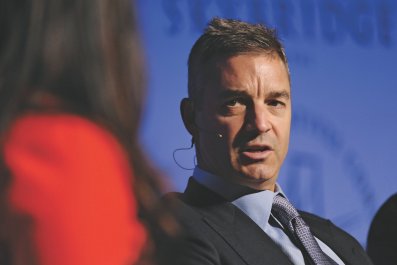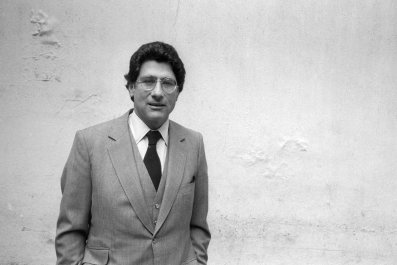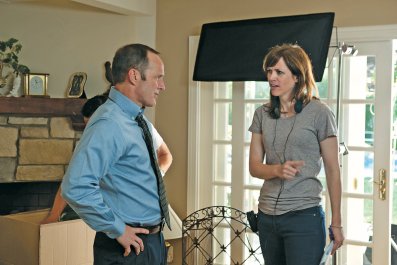Walter Bortz and Aubrey de Grey are both sights to behold. It's a Friday morning—opening time—at The Tied House Brewery and Café in Mountain View, California. Flags emblazoned with the logos of local sports teams (San Francisco Giants, San Jose Sharks) dangle from the rafters, and colorful signs for house-made ales (New World Wheat Beer, Hoptopia IPA) adorn the yellow cinder-block walls, in typical microbrewery fashion.
Bortz appears first: tall, lean, tanned, in a white polo shirt and brown sport coat, with a shock of white hair. Three months ago, Bortz participated in his 10th Boston Marathon, and 43rd marathon overall. He is 83 years old.
De Grey, 50, materializes next. He looks like some sort of steampunk shaman: long russet-gray hair, pulled back in a ponytail; equally long beard, with a footlong mustache to match; lavender striped shirt unbuttoned past his sternum; dark jeans; and what appear to be black Dr. Martens boots. De Grey is six feet, 150 pounds or so. Wraithlike. He has saved us a table near the window.
Bortz and de Grey have never met before, but they have a lot to talk about. I've asked them to come to the Tied House today—de Grey from eight blocks away, where his SENS (Strategies for Engineered Negligible Senescence) Research Foundation is headquartered; Bortz from nearby Stanford, where he teaches medicine—to discuss a subject that has obsessed both of them for decades: the process of aging, and how it may change in the decades ahead.
Questions about the future of aging have been in the air lately. Are humans on the cusp of living to 120, 130, or more? What will aging look like in this new world of longevity? Will we just be adding 30, 40, 50 years to the end of life, or can we delay the process and lead normal lives to such advanced ages? Is 100 the new 60?
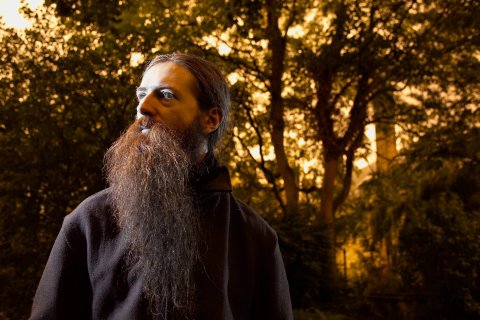
In 2012, the John Templeton Foundation awarded UC-Riverside philosopher John Martin Fischer $5 million to study immortality, and in May, Fischer announced that nearly half of that money would be going to 10 scientific research teams from the United States and Europe. Earlier this year, Prudential Insurance Company launched a new ad campaign centered on a simple prediction: "The First Person to Live to 150 Is Alive Today." And in June, two rivals for the title of the world's oldest person—Japan's Jiroemon Kimura, who, at 116, was the longest-living man ever verified, and China's Luo Meizhen, who claimed to be 127—died within days of each other.
Neither Bortz nor de Grey is a stranger to publicity. A former co-chairman of the American Medical Association's Task Force on Aging and past president of the American Geriatrics Society, Bortz, a physician by training, is one of America's foremost experts on robust aging, having published more than 150 scientific articles on the subject. His "thesis," as he calls it, is that exercise is the key to extending the human life span. "We know enough to live 100 healthy years," Bortz says, "but we screw it up."
I predict that the first person to live to 150 is probably already in middle age.' –de Grey
De Grey, meanwhile, has been a favorite subject for journalists since the early 2000s. As an undergraduate at Cambridge, he studied computer science; his specialty was artificial intelligence. But soon after graduation, he met and married Adelaide Carpenter, a Cambridge fruit-fly geneticist 19 years his senior, took over the genetics department's drosophila database, and immersed himself in the biology of aging. In 1999, de Grey published The Mitochondrial Free Radical Theory of Aging; a year later, Cambridge awarded him a Ph.D.
De Grey's new theories were grand. He believed that by dividing the diseases of old age into seven categories of cellular and molecular damage, and then by working to conquer each category through as-yet-undeveloped medical technologies, it would be possible to "cure" aging—not to stop it, or to slow it, but to repair and reverse it, the way one would restore an aging automobile, and to live indefinitely as a result. In 2000, de Grey co-founded the Methuselah Foundation, which awarded multimillion-dollar grants to scientists who extended the healthy life span of mice, and in 2009, the organization evolved into SENS, a nonprofit that sponsors and funds scientific rejuvenation research. Its major benefactor is Peter Thiel, the billionaire founder of PayPal.
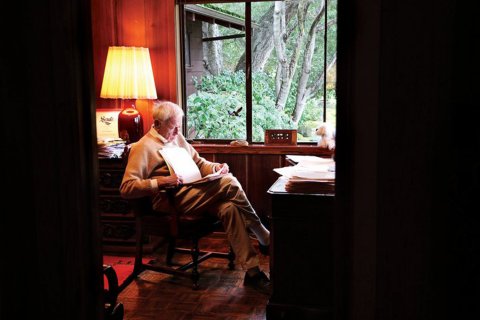
Despite equally high profiles, however, Bortz and de Grey come from different sides of the scientific tracks. Bortz is a man of medicine; de Grey is a man of ideas. For years, scientists have been wary of jousting with de Grey. "I prefer not to be involved with Aubrey de Grey," one told me. "My policy is to stick closely to the science." What he does and what we do are different, others say. We rely on the scientific method. He is merely making predictions.
De Grey admits as much. "I say people who are alive today are going to be able to live indefinitely because this technology is foreseeable, and people respond that there's no scientific evidence available for that," he says. "Well, of course f--king not. It's technology. It's not science. Technology isn't like that. You have to make these leaps of faith, but you also have to have some idea how realistic those leaps of faith are, and you have to say so or else no one's going to be interested. No one's going to be enthusiastic. And no one's going to pay for the research to get there."
In other words, de Grey sees himself less as a scientist than as an activist bent on expanding the horizons of aging R&D. And not all experts think he's nuts. In 2005, the MIT Technology Review offered $20,000 to any molecular biologist who could demonstrate that de Grey's plan for curing aging was "so wrong that it was unworthy of learned debate." The judges—who included Nathan Myhrvold, former chief technology officer of Microsoft, and J. Craig Venter, who shares credit for first sequencing the human genome—found that "none of the 'refutations' succeeded," as Myhrvold later told The Washington Post. "[They] were either ad hominem attacks on de Grey, or arguments that his ideas would never work (which might be right, but that is what experiments are for), or arguments that portions of de Grey's work rested on other people's ideas. None of these refute the possibility that he is at least partially correct."
At first Bortz was reluctant to engage with de Grey, too. But after reading about de Grey's ideas, he sent me an email. "Very interesting," Bortz said. "Will study."
It's now a few weeks later, and Bortz and de Grey are settling into their seats at the Tied House. Both order the tandoori pork kabobs; de Grey requests a pint of dark beer. I have dozens of questions. Is Bortz's version of the future of aging—exercise a lot, live to 100—enough? Or should we be looking beyond it as well, to de Grey's? Then again, is de Grey's future even attainable? Or is it just a fanciful theory, unworthy of the time, energy, and money it would take to get even a fraction of the way there? Below is an edited version of our conversation.
NEWSWEEK: My inspiration for embarking on this story was, strangely enough, a Prudential insurance billboard. "The first person to live to 150," it reads, "is alive today." Have you seen it?
Bortz: You can't miss it.
De Grey: It's all over.
NW: And what was your reaction to it?
Bortz: I'm sure they varied.
De Grey: Go on, Walter. You first.
Bortz: I didn't believe it. Maybe a couple thousand years from now it might happen. One of my reference points is the International Supercentenarian Registry. It's a list of people who are 110 or older. We know there are about 80 supercentenarians out there. And my take-home from seeing photos of them recently was this: you don't want to be a supercentenarian.
De Grey: As things stand.
Bortz: Right. But as things stand now has been going on for quite a while. I'm not convinced that I want to be 120 or 130.
NW: What was your reaction to the billboard, Aubrey?
De Grey: My reaction was the exact opposite of Walter's. I predict that the first person to live to 150 is probably already in middle age, and that most people who are in their 20s now will probably live to at least that old. But the reason I say that is only because of the specifics of the type of biomedical technology that I think is going to come along.
NW: What kind of biomedical technology are we talking about?
De Grey: The work we do at the SENS Foundation is all about regenerative medicine. It's not about slowing down aging at all, but actually, bona-fidely reversing aging—repairing the accumulation of molecular and cellular damage that builds up throughout life, as a side effect of the body's normal operation, and eventually kills us. Now, if we can do that fairly comprehensively—and it has to be comprehensive, because if we only do half of it, the other half kills us anyway—then it's not just people who are born at that time who are going to benefit. It's people who are already in middle age or older who are going to benefit. Someone who is in their 30s right now, they'll be in their 60s 30 years from now. I think we have a good chance at being able to repair them so well, rejuvenate them so well, that we will be able to take them back to being biologically 30 or 40. And furthermore to do that repeatedly so that people can stay genuinely youthful for a lot longer. And of course, health is the main risk factor for death, so if we can keep people youthful and healthy, then we're going to stop them dying.
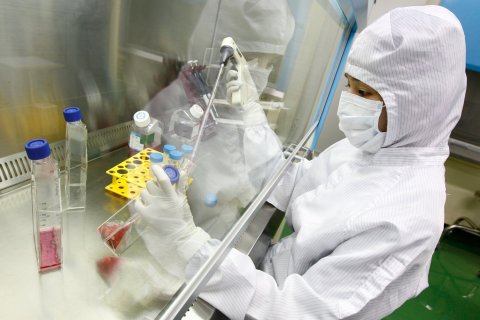
NW: So in your vision, Aubrey, the future of aging is that we don't age at all—that we don't spend an increasingly long time as old people, but rather that we reverse the process before we ever get "old" in the first place.
De Grey: Correct.
NW: Why do we age?
De Grey: There are a lot of details we don't know, but in broad terms, the accumulation of damage happens because there are gaps in the inbuilt self-repair machinery the body has. When one animal lives longer than another, it is simply because their automatic self-repair machinery is more comprehensive—the gaps are smaller, if you like. So less damage accumulates, or the damage accumulates more slowly.
It's really just the same way we see aging in any simple man-made machine. Machines with moving parts do tend to accumulate various types of damage. Initially it's harmless, whether it's rust on a car or whatever. That damage eventually makes the doors fall off.
NW: Walter, do you agree with Aubrey's definition of aging?
Bortz: My definition of aging is broader in that it's not just human-driven. It's universal. Everything in the universe ages. To me, aging is the effect of an energy flow on matter over time. That is not confined to life. It's inorganic as well as organic. It takes in canyons and Chevys and everything.
NW: What's the longest a person can live, as far as we know? What's the outer limit?
Bortz: Madame Calment—I believe there is a consensus—was the oldest person on record to be validated. She was almost 123 in Arles, France. That's as old as we know. It's possible that there have been older people, but most experts have said it's unlikely.
NW: And what about the average person? How long can most of us expect to live today?
Bortz: My first book title was We Live Too Short and Die Too Long. I want to go full bore and get it over with. The way you do that is keep your foot down on the pedal of life. And keep your RPMs at a certain level. I've described what I call a metabolic field that has metrics—it has parameters to it. And there is this range of optimality. If you go too fast, that's stress. But on the other hand, there's frailty: the result of ineffective, insufficient energetic stimulus. Stay in between those two extremes. The golden mean. I think that gets us to 100. After 100, it's negotiable. Maybe we can go on to 120. But I still think the average human life span is energetically ordained around 100.
NW: Why 100? Why that number?
Bortz: I think that came down genetically. That's what we were given. It's a measure of use and disuse, repair and disrepair. One hundred is a legitimate medical goal based on what we have now. We know enough to live 100 healthy years, but we screw it up.
NW: Aubrey, do you agree?
De Grey: I'm basically in agreement with that. I'm perhaps not quite so optimistic as Walter about what the average person can do today. I'd probably put it in the early 90s as opposed to 100.
What I am absolutely sure of is that, with current medicine, no one is going to live much longer than 120. Jeanne Calment died in 1997. Nobody has beaten her in 15 years. And in fact, nobody has come close. The runner-up was three years behind. 119. And that was only a couple of years after Jeanne Calment herself. At the moment, the oldest person is 116, I think. This is particularly remarkable because the number of living people over 110—the number of validated supercentenarians—has basically not changed over the last decade. It's stayed around 80, as Walter said. And yet the number of centenarians has rocketed by a big factor. It's a paradox.
NW: Why has the number of supercentenarians stalled out around 80?
De Grey: Between 100 and 110 years old, some kind of wall of death is hitting people who have everything going right for them. It's different in different countries. Different diseases hit at different times. Different diseases become prevalent depending on diet and culture, and also prosperity. But there's definitely a phenomenon there.
NW: We're basically bumping up against the current limits of the human life span. But what's next for aging? What do you expect to happen in the short term—over the next 10 or 20 years?
De Grey: I would say over the next 10 or 20 years, it's highly likely that the increase in average life expectancy that we've seen—and that's been going up by a couple of years each decade for quite a long time now—that's actually going to level off.
Bortz: It may even go down.
NW: Why?
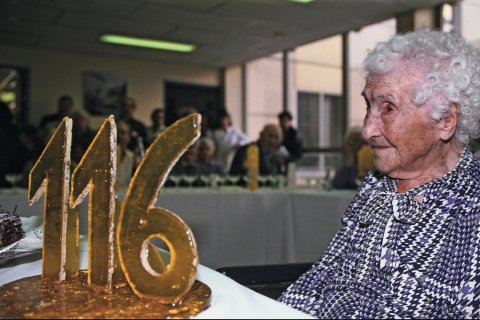
Bortz: Because of increasing obesity and diabetes.
De Grey: That's true. Either way, the gains achieved by simply improving people's prosperity, improving people's nutrition early in life, ending infant mortality, and so on, have pretty much been made already, and therefore people who are dying 10 years from now will have had pretty much the same early-life health as the people who are dying today, so they will die at pretty much the same age.
NW: Is there anything we can we do, in the short term, to live longer?
Bortz: Change behavior. Exercise is the current anti-aging process. The most powerful thing we can do today is to get people to take a walk. How do you do that? That's the frontier. I want a biomarker for fitness. I think that America is a whorehouse. It does what pays. So if we could reward someone like me, an 83-year-old marathoner, with a lower premium—that's the single biggest public-health opportunity in front of us today. I'm focused on, how do I get America to walk? To me that's a tangible, proven thing.
De Grey: At the moment, there is far too much emphasis on treatment and far too little on prevention. Essentially the psychology of addressing aging now revolves around waiting until people are already sick and then doing your best to fix them up for as long as you can—which isn't very long. It's pathetic.
NW: So what is the future of aging? Imagine that it's 2033. We're following the Walter Bortz regimen. More of us are exercising, and taking advantage of the latest medicine, and living fairly healthily to 100 or so because of it. We're still going to hit that wall of death—maybe at 110, maybe at 120—and we're still going to be spending more time on this planet as very old people, which doesn't sound so great.
Bortz: Give me a hundred years. I can still screw. I can still run. And then I'm home.
NW: But is there anything beyond that?
De Grey : My view is that, beyond the next 20 years, we are going to be able to implement technologies that take aging seriously, that give it the respect it deserves. At the moment, we are treating the diseases of old age as if they were curable. But actually, because aging is a side effect of being alive in the first place, of course they can't be cured.
NW: Your belief is that they can be prevented, or at least reversed before they do too much harm.
De Grey : Back in 2000, I realized that all of the types of damage that gerontologists knew about could be classified into a very manageable number of categories. Just seven categories of damage. Three of them are cellular-level damage, and the other four are molecular.
The cellular-level types of damage are simply to do with the number of cells you have. You can get increasingly fewer cells in a particular organ or tissue if the cells are dying at a relatively modest rate and are not being replaced by the division of other cells. That's important in heart failure.
The other types of cellular damage are ways in which you can have too many cells. Firstly, you can do that by having cells dividing when they're not supposed to. Then you can have cells not dying when they're supposed to. That's an extremely important part of how the immune system works. The immune system is impaired late in life by the accumulation of cells that are refusing to die when they should.
Then, as we go on to the molecular ones, there are two that happen inside cells and two that happen outside. First of all, there are accumulations of mutations in a very special part of the cell called the mitochondria, which do the chemistry of breathing, basically. Mitochondrial mutations are bad for you in a lot of different ways. So we need to fix that.
The other type of damage inside cells is the accumulation of simple molecular garbage. So, junk—just byproducts of normal metabolic processes, which for whatever reason the cell does not have the machinery to break down or excrete. This is what causes cardiovascular disease. It's also what causes macular degeneration, the main cause of blindness in the elderly.
The most powerful thing we can do today is to get people to take a walk ... that's a tangible, proven thing.' –Bortz
That just leaves the two types of damage that happen outside cells. The first is simply more molecular garbage. The best-known type of molecular garbage in aging is the amyloid plaques that accumulate during Alzheimer's disease in the brain.
And finally, there is crosslinking. The reason our bodies have the shape they do and stay together is not just because of the skeleton. It's because of a sort of second skeleton, if you like—the extracellular matrix. This is the lattice of proteins that is just on the edge of the body, and it's built very carefully to keep tissues having the physical properties they have and the shape they have. And it's very important that the extracellular matrix should be elastic. Turns out that there are chemical reactions that happen throughout life that reduce the elasticity of the extracellular matrix.
This causes a bunch of things that are not life threatening. It's the reason we get wrinkles, for example. But it's also very important for a major life-threatening thing: hypertension. The major arteries get less elastic and able to tolerate the pulsating heartbeat, and that causes high blood pressure.
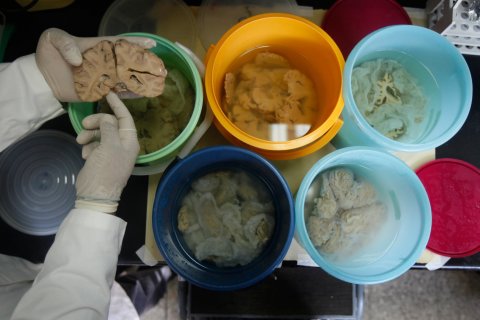
NW: So what is your vision for aging after, say, 2033 or so?
De Grey: I believe that, based on what we can already do, and on the research that is going on both in our labs and elsewhere, that within 25 years we have a good chance—maybe a 50/50 chance—of developing therapies that are good enough that they can really be called comprehensive.
Now we don't have to fix everything. The wonderful thing about aging is that it doesn't actually matter until you get into middle age. In other words, the body is made up to tolerate certain amounts of these various types of damage. So if you can fix most of the damage, so long as you can fix most of every type of damage ...
NW: You buy yourself more time to address the rest.
De Grey: That's right.
NW: You mentioned the progress that's already been made. What makes you so confident that your goal is achievable in just a few decades?
De Grey: Ultimately how far away you think some future event is in technological progress depends critically on how much we still have to do. And in order to know how much we've yet to do, you actually have to know the literature. This is what I do. I spend all my time hanging out with the scientists at the cutting edge of all of the various disciplines that I have brought together under the umbrella of SENS. Even those scientists are more pessimistic than me. But not about their own components.
NW: It's the 2030s. I'm in my 50s. What does my life look like, in your vision of the future of aging?
De Grey: You look and feel and function just like you do today.
NW: How?
De Grey: Because of regenerative therapies. Essentially, what I want to do is put Walter out of business. I want to make sure that we don't have what we have today, namely the moral and financial and, you know, health obligation to behave in a particular way in order to stay healthy, because we'll stay healthy anyway. And the reason we'll stay healthy anyway is because therapies will exist at a totally affordable price that will compensate for anything that today would be bad for you.
NW: So I wake up one morning, and I notice I can't see as well ...
De Grey: That won't happen. You will be going into a clinic and getting a bunch of stuff that you don't understand that keeps you healthy.
NW: And when will that start? At what age will I begin doing that? I have to exhibit some signs of aging ...
De Grey: No you don't. You just have to be sufficiently close enough to the age at which you might start exhibiting signs. So I would say 40, 50.
NW: And these treatments are doing what to me?
De Grey: Restoring the molecular structure and the composition of your body to how it was at a younger chronological age. There are stem-cell therapies that are putting cells back into organs that are losing cells. There are enzyme therapies that are removing molecular garbage from inside the cells that would naturally accumulate garbage. There are immune therapies that are removing garbage from the space between your cells. There are pharmaceuticals that are breaking down the chemical linkages that are stiffening your arteries. This is all stuff that scientists are working on today, and that I believe is possible to achieve within a few decades.
NW: Give me a specific example.
De Grey: Take molecular garbage in the cell. The problem here is that we've got really versatile garbage-destruction machinery, but it's not completely, 100 percent versatile. There is some stuff it can't break down. So what we've been doing is actually looking for bacteria in the environment that can break down substances in the body that cause age-related ill health. And we've found that it's rather easy to discover such bacteria. What we do then is find the genes and enzymes those bacteria have that allow them to actually destroy the substance, and we incorporate those genes and enzymes into human cells so as to augment the destruction machinery of the cells.
When we can do this, we will have a therapy that can truly eliminate cardiovascular disease. No one will need to get heart attacks and strokes anymore, because we will be able to stop fatty deposits from accumulating in the arteries.
NW: How often would I get these treatments?
De Grey: That's something we can't really predict. Of course they'd always have to be applied periodically; you could never do it just once and become nonaging any more than a machine could. But it's probably going to vary from one therapy to another. Therapies that are very invasive—therapies that involve surgery to replace a whole organ, for example—you might only have to do every 20 years. And I would certainly hope that we wouldn't need any therapies like that once the whole panel of interventions had become reasonably mature.
An intervention that involves stem cells or the injection of genes for gene therapy—you might have to do something like that every 10 years.
And I could imagine that some of these therapies might get to the point of not even being injections. They might be orally administered. And for things like that there seems to be no reason why, in principle, they couldn't be applied once a month.
NW: So I would keep reversing the signs of my own aging when it becomes troublesome and returning to the age of 25?
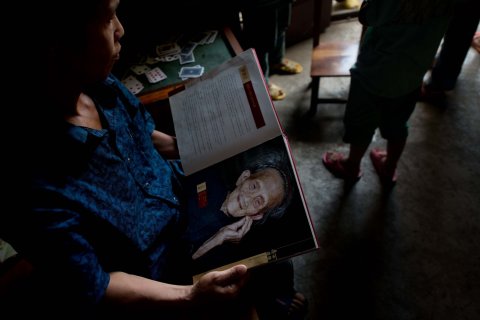
De Grey: Exactly. When you think about it, it's obvious, really. If we have sufficiently comprehensive ability to do this repair and maintenance, then why shouldn't it work?
NW: Would people have to stop having children?
De Grey: Not necessarily. There are other causes of death, first of all. Not just aging.
NW: What about overpopulation?
De Grey: We know that fertility rates are coming down all the time. Whenever a country reaches a certain level of emancipation and education of women, then we get this plummeting fertility rate. So that's good. Then women are going to keep having their children later and later, and when we don't have menopause anymore, they'll have them later still. Possibly the most important factor is that the carrying capacity of the planet keeps increasing as a result of other technologies. So the big thing that's going to happen fairly soon is that we're not going to use so much fossil fuels because we'll have better renewable energy and nuclear fusion and so on.
NW: I have to admit: my first reaction is to imagine some sort of science-fiction dystopia.
De Grey: But why are you imagining that? You've seen too many films. I think that it is really tragic that people have such a knee-jerk tendency to presume that the defeat of the thing that kills two thirds of all people is actually going to do more harm than good. It's outrageous, really.
NW: But would we really want to live forever?
De Grey: The reason why we want to live a long time is not to live a long time. It's that we want to not get Alzheimer's. Do you want to get Alzheimer's?
NW: Not particularly.
Every day that I bring the defeat of aging forward is 100,000 lives that I've saved.' –de Grey
De Grey: All right. Do you think there's some age at which you will want to get Alzheimer's?
NW: Probably not.
De Grey: Exactly. It's the same for cancer and other diseases. That's why it's so important for me to emphasize that any longevity benefits that we get out of this are just a side effect.
NW: I want to bring Walter back into the conversation here. Walter, what is your response to all of this? Do you buy it?
Bortz: I think it's the wrong target. If we have a finite amount of societal resources, I would rather put them into something that is tangible and knowable, like exercise. And I'm very worried about the catastrophe of complexity—a situation in which there are so many variables. We thought cancer was this, this, and this. But cancer is just a total gamish of thousands of variables. So if you're looking for a magic bullet, Aubrey, you need a huge shotgun. Because your target is way too big. You can't know everything—but you don't have to know everything, just enough.
De Grey: Walter is absolutely right. There's only so much you need to know to actually get results. The question is, how much do you need to know? Do we yet know enough? And the only way to find out is to try.
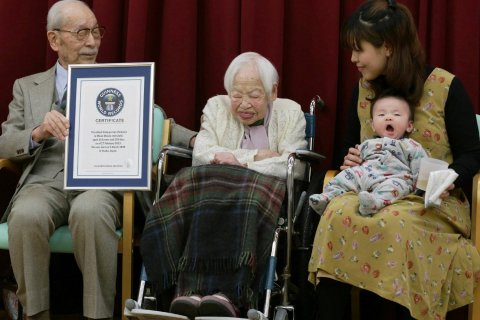
Bortz: I think the human brain has a blockage. We think of things rather than events. Life is a verb. It's not a noun. There's so much going on, and yet we are foreclosed to thinking, I'm going to get one answer to this problem. But the problem is incredibly complex and cosmic, and one thing affects another. There would be unforeseen consequences to meddling with our cells and genes.
NW: So you think Aubrey's seven categories of damage—and his belief that they can all be reversed—is too reductive?
Bortz: Life has been around for 4 billion years. I don't see any immortality.
De Grey: But suppose you were wrong, Walter. Suppose there was even a little bit of chance that we could actually extend people's healthy, valuable, productive life by a long way. By giving this sort of message to people, what you're doing is delaying that nirvana, right?
Bortz: I've got no trouble with that.
De Grey: But that means you're costing lives. What you're doing is you're disincentivizing the research that could save lives.
Bortz: I know what the research says that will save lives right now.
De Grey: Yes, but you don't know enough about the research that might save lives in the future. This is exactly the same as the war on cancer. Back in the 1971, when Nixon announced the war on cancer, he did that because, number one, scientists were actually saying if we have plenty of money we can cure cancer completely in 10 years. But he also announced the war on cancer because he thought that the public was ready for it. And sure enough it was true. The critical thing to point out here is that even though progress against cancer has been far, far slower than it was predicted to be 40 years ago, there's been no diminution of enthusiasm—no diminution of support, no diminution of money. Once the public gets the bit between its teeth, once politicians get the bit between their teeth, game over. It's going to happen as fast as the science allows, however fast that's going to be.
NW: But what if your ideas are theoretically correct, and yet they are like being able to travel at the speed of light—that is, a finish line we may never reach. As you said, progress on cancer has been much slower than predicted.
De Grey: But it's been a hell of a lot faster than it would have been without the money.
NW: But it doesn't matter how fast progress is if you never arrive at your goal—which, in this case, is a comprehensive set of regenerative therapies.
De Grey: False. You are going to get there. It's just a question of not knowing how soon. Now, I don't care how soon. I don't get out bed in the morning because I want to save my own life, or your life, or Walter's life. I get out of bed in the morning because every day that I bring the defeat of aging forward is 100,000 lives that I've saved. And I don't care which hundred thousand. I don't care ...
NW: ... how far in the future they may be.
De Grey: Exactly.
Bortz: I'm a prisoner of the serenity prayer. Change what you can. Accept what you must. And know the difference.
NW: Aubrey, I get the sense that you disagree.
De Grey: I'm not into accepting anything. My take is don't be overoptimistic. Accept the difficulty of what you cannot yet change. But do not accept the impossibility of ever changing it.








